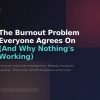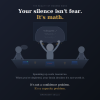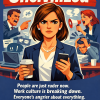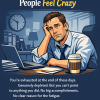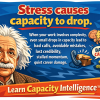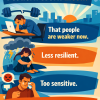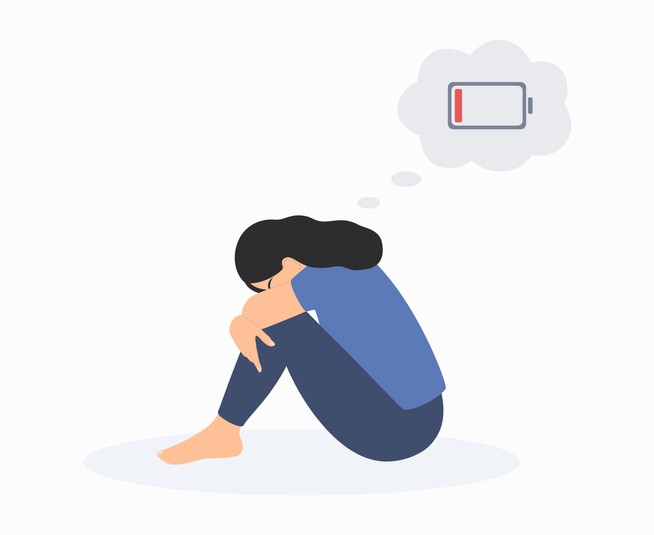
"No Worries, I'll Figure It Out" — When Anxiety Speaks Through Professional Calm
44% of professionals report daily workplace stress. Learn how anxiety masks itself as professional calm and practical grounding techniques to transform presentation anxiety into focused presence.
It's 2:47 p.m. and I just said "No worries, I'll figure it out" to my manager.
Third time today I've said some version of that. Fourth if you count the one to myself in the bathroom mirror this morning. My chest is doing that thing where it feels like I'm wearing a too-tight sports bra except I'm not wearing a sports bra, I'm just sitting at my desk eating almonds I don't want because I forgot lunch was a thing humans do.
The presentation. Six days.
I opened the deck this morning, looked at slide three, and immediately checked my phone. Then checked it again. Then somehow ended up reading about whether almond milk is actually sustainable (it's not, apparently, which—great, one more thing). This is fine. Everything's fine. My Slack status says "🎯 Deep work" which is technically true if "deep work" means "spiraling about whether I'll remember how to speak English when the VP asks a question."
Anyway. 44% of professionals report daily workplace stress, per Gallup, which honestly feels low but maybe the other 56% are just better liars than me.
Where was I going with this? Right. The thing where we all pretend we're fine.
The Professional Anxiety Phrasebook (That Nobody Asked For But Here We Are)
You know what these phrases actually mean? Let me tell you, because I've used all of them this week:
"Circle back" — I need to frantically Google this thing I'm supposed to already know, maybe cry a little in the supply closet, then respond like I've been calmly considering options.
"I'll let you know when I'm ready" — Bold of you to assume I'll ever be ready. Ready is for people who don't spend forty minutes choosing which shirt makes them look like they know what they're doing.
"I've got it under control" — Nothing is under control. The to-do list has a to-do list. I'm one spilled coffee away from a full breakdown but go off I guess.
The weird part? These work. They buy time. They maintain the illusion. And sometimes—not always, but sometimes—the illusion carries you far enough that you actually do figure it out. Or at least figure out how to look like you figured it out, which in corporate America is basically the same thing.
But here's what the 76% statistic about stress affecting health doesn't tell you: it's not just the stress. It's the performance of not-being-stressed that's exhausting. The acting. I should get a SAG card for the amount of "I'm fine" I perform weekly.
Your Brain Is Trying to Save You (From a Threat That Doesn't Exist)
So presentation anxiety. Your amygdala—which is this almond-shaped thing in your brain, fun fact I learned when I was procrastinating the other day—can't tell the difference between a PowerPoint deck and an actual bear.
Wait, side note: why are so many brain parts named after foods? Amygdala means almond. There's a part called the hippocampus which sounds like a college for hippos but is actually Greek for seahorse. Anyway.
Point is, your brain sees "high-stakes presentation" and goes full caveman. Floods you with cortisol. Heart rate up. Helpful suggestion from your lizard brain: maybe just run away right now.
Your thoughts spiral ("what if I freeze up"), your body responds to the thoughts (hello, sweaty palms), which makes your thoughts spiral more ("oh god now I'm sweating AND anxious"). It's a terrible feedback loop and your brain thinks it's helping.
The prefrontal cortex—the part that does smart things like "plan presentations"—gets less blood when you're stressed. The amygdala gets more. So asking someone to "just calm down and practice" when their brain's in threat mode is like... I don't know, asking them to do calculus while being chased. Technically possible, mostly useless advice.
I've been in 🟡Yellow Zone for most of this. Started in 🟢Green around the intro, slid down somewhere around the hippocampus thing. Which is fine. The tools work even when you're not at your best. Kind of the whole point.
The Part Where I Admit I'm Not Immune to This
Here's the thing that's embarrassing to write: I literally built a framework about this. Zones, regulation, the whole Confidence & Calm Under Pressure pillar. I teach these tools.
Yesterday I told my co-founder "I'll figure it out" while my hands were shaking. Like, visibly. She didn't mention it. We both pretended my hands were steady. This is what we do now.
Knowing the tools doesn't make you immune to needing them, is what I'm saying. I can explain the neuroscience of anxiety and still have a panic response to Outlook calendar notifications. These things coexist. It's weird but it's fine. Mostly fine. It's fine-adjacent.
The thing nobody tells you about working in wellbeing is you still have to... be well. Or at least functional. The Confidence pillar isn't about never feeling anxious—I used to think it was, which, lol—it's about having moves when anxiety shows up at 3am or right before you're supposed to talk to the board or when you're writing a blog post about anxiety and meta-awareness kicks in and suddenly you're anxious about whether you're writing about anxiety correctly.
(Am I doing that right now? Maybe. It's fine. Where was I?)
81% of employees want workplaces that support mental health. Which means 81% of us are dealing with some version of this. The performance anxiety. The imposter thing. The "what if they realize I'm making this up as I go" spiral that lives in the back of your brain like a shitty roommate who won't move out.
This isn't personal failure. It's the job. The job is to pretend you're fine while also being perpetually uncertain about everything because nothing is stable anymore and every quarter brings new chaos but sure, present with confidence.
Okay So Here's What Actually Helps When You're Spiraling
There's this grounding technique—sounds stupid, works anyway—that interrupts the panic spiral in about 90 seconds. It's not breathing (that comes later). It's not positive thinking (brain won't buy it when you're panicking). It's something more concrete. Annoying specific, actually.
The basic idea: you're hijacking your nervous system by giving your brain something concrete to do. Forcing your prefrontal cortex back online when the amygdala's screaming. It's like hitting Ctrl+Alt+Delete on your nervous system, except it actually works.
Works maybe 70% of the time for me. Better odds than wine, cheaper than therapy, less weird than that tapping thing I tried once. (EFT? ETF? One of those acronyms. Didn't work anyway.)
I used it twice while writing this section. Once because I was actually anxious, once because I wanted to make sure it still worked. Both times: still anxious after, but manageable anxious. 🟡Yellow Zone instead of 🔴Red Zone. Which is the whole point—you're not eliminating anxiety, you're making it possible to function alongside it.
The full technique with zone-specific versions lives in the Confidence & Calm Under Pressure pillar, because there's a version that works even when you're 🔴Red Zone and can barely think.
The Pre-Presentation Thing I Do (When I Remember)
Most advice says visualize success. Sure. When I'm anxious, I can't visualize anything except the part where I forget how words work. So that's useless.
More useful: have something to actually do. Something physical and specific so your body has instructions instead of just panic.
I've got a three-part ritual—20 minutes before, 5 minutes before, right before. It's not complicated. Mostly involves water, breathing that even I can't mess up too badly, and one specific mental shift about who you're actually presenting to. (Hint: not "everyone.")
Does it eliminate anxiety? No. Does it make me 40% more functional? Yeah. Does 40% more functional count as a win? In this economy? Absolutely.
I don't know, does this count as a benefit? Having alternatives to suffering? Feels like a low bar but also that's kind of where we're at.
(Was going to make a joke about capitalism here but lost the thread. Imagine something biting about productivity culture. You get it.)
The Brain Lies You're Probably Telling Yourself Right Now
"Next week will be calmer."
Will it though. Will it really.
That's optimism bias talking. Your brain's uncomfortable sitting with the reality that presentations will keep happening and you'll keep being anxious about them, so it invents a future where everything's magically easier. Spoiler: next week you'll say the same thing about the week after.
I'm doing this right now actually. "Once this post is done, I'll have more time to prep the presentation." Except after this post there's the Q4 planning doc and the website updates and the 47 Slack messages I'm ignoring. There is no calm week. Calm week is a lie we tell ourselves to get through Tuesday.
The alternative isn't pessimism—it's just... building the skills now. While you're in 🟡Yellow Zone and can actually learn them. So they're available later when you're 🔴Red Zone and desperately need them but don't have the bandwidth to figure out something new.
Status quo bias is the other one. Better the anxiety you know than the tools you don't, right? Your brain prefers familiar suffering over unfamiliar effort. Which is why we keep doing the same thing and expecting different results, which is—wait, isn't that the definition of something? Insanity? Or just being human, I forget.
You're already paying for the avoidance. In stress, in sleep, in shoulder tension that probably needs physical therapy but who has time for that. The cost of trying something new is maybe 20 minutes of feeling awkward. The cost of not trying is this. Forever. Same anxiety, same presentations, same "I'll figure it out" until you're 60 and still haven't figured it out.
Not to be dramatic. But also yes to be dramatic because sometimes dramatic is accurate.
(Definitely sliding into 🔴Red Zone now. Can feel it. Gonna do the grounding thing after this paragraph. Maybe.)
Where This Fits (If You Care About Frameworks, Which, No Judgment)
This is Reset phase stuff. The part where you're just trying to stop the freefall. Where "I'll figure it out" stops being a strategy and becomes more like a prayer.
Teams in the top engagement quartile show 23% higher profitability according to—Gallup? McKinsey? One of those companies that measures things. Point is, engagement matters. But translating that to personal level: what you're buying with these tools is the ability to show up to a presentation and be there. Present. Instead of spending 30 minutes in your head cataloging every micro-expression that might mean someone thinks you're incompetent.
The zone thing matters but I keep forgetting to explain it properly. 🟢Green Zone: you can learn these techniques calmly, practice them, maybe even enjoy the process. 🟡Yellow Zone: they take more effort but still work. This is where most of us live. 🔴Red Zone: you need the simplest version, just the grounding, nothing fancy, don't ask me to visualize anything or count to ten.
I think I was supposed to connect this to other pillars. Communication—hard to speak up when anxious, obviously. Emotional Mastery—something about anxiety not being the enemy? These skills stack. Fix one, improve both. There's a whole power pairs thing in the framework but honestly right now I'm just trying to finish this section before my next meeting.
The presentation is in five days now. I wrote this whole thing about managing presentation anxiety and still haven't actually opened the deck since this morning. Is that ironic? Or just predictable? Both probably.
Quick Detour Into Why This Is All Bullshit
$8.8 trillion. That's what low engagement costs globally per year. TRILLION. With a T.
And the solution is... what, pizza parties? A wellness webinar at 4 p.m. Friday when everyone's already mentally checked out? Another email about resilience from leadership who definitely have executive coaches and sabbaticals written into their contracts?
76% of workers report burnout. Three quarters. And we're out here being told to practice gratitude and do breathing exercises like the problem is individual failure instead of systemic extraction.
I'm not saying the tools don't help—they do, obviously, that's the whole post. But I'm also saying it's rage-inducing that we need tools to manage the anxiety created by workplaces that could just... be less anxiety-inducing?
You know what would help with presentation anxiety? Not having performance reviews tied to a single presentation. Not having every meeting feel like you're defending your right to employment. Not structuring entire companies around the idea that humans should be infinitely scalable and never uncertain about anything.
But sure. Let's all do grounding exercises so we can tolerate the intolerable with slightly better posture.
Sorry. I'm in 🟡Yellow Zone sliding toward Red. This section got away from me. The tools work. Use them. But also be mad about needing them. Both things.
I Don't Know How to End This
I'm at 2,800 words. That's probably too long. People don't read things this long anymore. But also I'm not sure where to stop because the anxiety thing doesn't have a neat ending. It just... continues.
The grounding techniques work. Used one twice while writing this. Still anxious, just less loud. That's the deal. Not magic, not transformation, just slightly more manageable. Which counts.
"No worries, I'll figure it out" isn't a lie, exactly. You will figure it out. You always do. But maybe you could figure it out with less suffering? With tools that acknowledge your body experiences stress even when your mouth says everything's fine?
The presentation is in—I checked again—five days, four hours, twenty minutes. Not that I'm counting.
I should probably actually prep for it instead of writing about anxiety avoidance. That would be the responsible thing. The 🟢Green Zone thing to do.
But I'm here, in 🟡Yellow, typing this, and the techniques are there when I need them. 5-4-3-2-1. The pre-presentation ritual I'll half-remember and half-improvise. The knowledge that anxiety is just my amygdala being bad at threat assessment.
Small wins. 🟡Yellow Zone victories. You felt anxious, did the thing anyway, your voice only shook once, nobody died, you get to count that as progress.
Not perfect. Not transformed. Not suddenly confident.
Just... fractionally less terrible at managing the thing that was already happening.
I could wrap this up better but I just got a calendar notification and my heart rate spiked and I need to go do the grounding thing again.
Progress. Ish. Good enough.
Ready to Stop White-Knuckling Through Presentations?
The Confidence & Calm Under Pressure pillar has the full toolkit if you want more than one messy blog post—grounding for different zones, cognitive tools, ways to work with nervous energy instead of against it.
